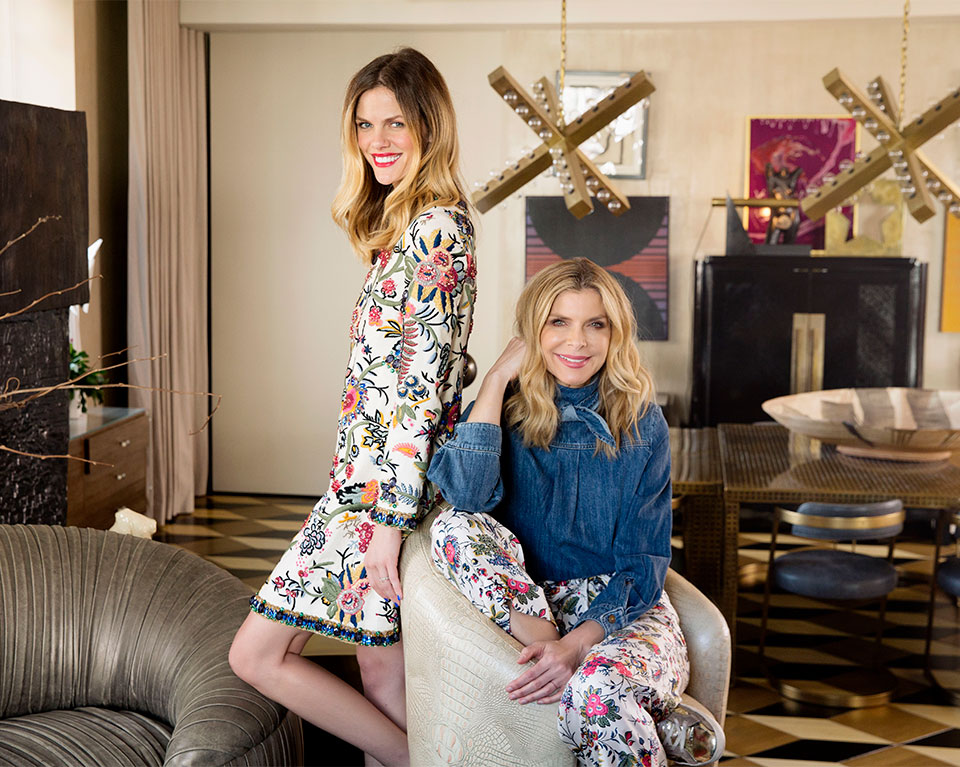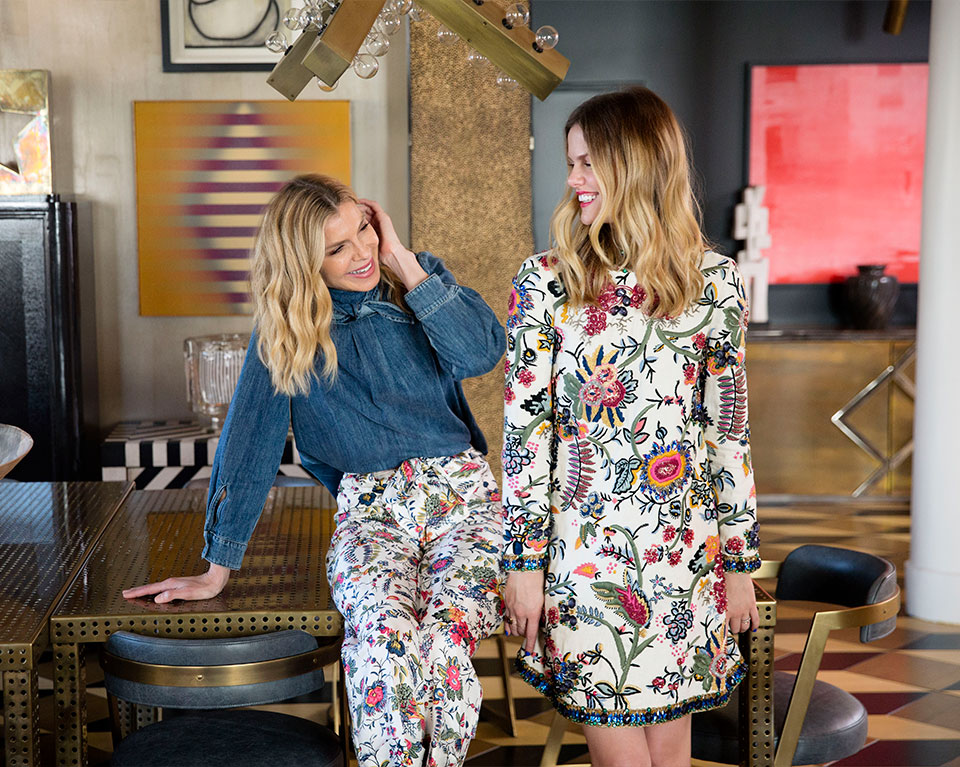
Quick — how much time do you spend deciding what to wear each day? Wait, let us rephrase that. How much time do you lose deciding what to wear each day, seeing the clock tick-tick-tick as you rummage through drawers or your closet? Even if it’s just a few minutes here and there, those moments add up. The stats: On average, a woman will spend two and a half hours per week thinking about what to wear. That’s 10 hours a month. Over five full days a year. Across a lifetime that adds up to, well, you can see where we’re going with this. Imagine what you could be doing instead…
Enter actress Brooklyn Decker and former journalist and news anchor Whitney Casey. They’re the founders behind Finery, a “wardrobe operating system,” as they call it, that helps catalogue your closet digitally so you can plan your outfits when you’re, say, waiting in line at the grocery store or on that long subway ride home. And unlike other similar apps out there, Finery’s technology will automatically sync your online purchases, via email receipts, to your virtual wardrobe — and that includes past buys. It accommodates store purchases, too. You can create wish lists, get notices when something you want goes on sale, easily style looks (both from your IRL wardrobe and your wish list), create outfits and drag them to a date on your calendar, get reminders when a “return” deadline is approaching… “When you think of an operating system, there are things happening in the background that you’re not activating,” says Casey. “That’s what we’re trying to do. We’re optimizing things you already do without you having to do it.”
“This is basically fantasy football for your clothing — that’s how my husband describes it,” says Decker, whose significant other is tennis pro Andy Roddick. “Everything you have and everything you want is in one space and you’re allowed to ‘play’ within it.”
Tory Daily sat down with the entrepreneurial duo, who just announced a new partnership with Match.com — Casey previously served as a consultant for the online dating site — that lets you share date looks as well as give and get feedback on them. They shared ace advice on what it takes to build your own company and how to be comfortable with — and conquer — the word no.
We first met when…
BD: A mutal friend set us up on a blind girls’…
WC: …tequila date?
BD: A friend of ours, who was living in Austin at the time but is now in Los Angeles, has a lot of friends around the country. She wanted to get everyone together, so we all did a girls’ weekend in Palm Springs. No one knew each other. Whitney always does something kooky — we call her capitán de fun — and, to break the ice, bought all these costumes. They were full-body foam costumes.
WC: We had a cactus, a taco, a bottle of tequila, a salt shaker and a bottle of beer.
BD: I was tequila and she was the cactus.
The most exciting part about owning a startup…
WC: Being nimble and agile. It’s like having a boat. At a big corporation, if you try to move the rudder — even if you have your whole team doing it — the boat goes nowhere. But in our situation, you move the rudder and the boat completely turns. You can come up with one idea that completely revolutionizes things. It’s not bureaucratic. The ideas are so powerful in a startup.
BD: To piggyback on that, we’re very big on feedback. We’re small enough — and smart enough — to move efficiently and respond to user feedback right away. There was one influencer when we were in private beta testing, Emily Schuman, who told us her kid’s clothes were coming into her virtual wardrobe on Finery. She still wanted to access her kid’s clothing, but didn’t want it to mix with her own. In a week, we created a children’s section. That was exciting.
And the most challenging…
WC: The same as my last answer. That the rudder will tip the boat over. So it’s both exhilarating and terrifying. Every day you can change things or wreck things.
BD: You really have to knock down doors, you have to ask for favors, you have to hustle. For me, that’s really difficult because I think our product speaks for itself. When you’re a new company, people are excited about the idea, but they don’t want to be the first to commit. Unfortunately, in today’s world, we don’t have a lot of people who are steering the ship; they want to ride the wake. You have to put yourself out there in a very big way.
WC: Asking for favors is very hard, especially for women. Men ask for favors all the time.
BD: We apologize for it, we feel bad about it… But as a scrappy business, that’s what you have to do. There is no successful business that did not have a ton of hustle in the beginning.

One thing I know now that I wish I knew starting out…
BD: I wish I would have said no. Because when you’re young and especially when you’re a woman — and especially when you’re in entertainment — you feel like when you say no, you will lose opportunities and lose your window. There’s a lot of pressure to please when you’re young. That said, at this point, as an adult working on a company, you know that saying no is incredibly powerful. It’s actually better not to waste anyone’s time. It’s efficient.
WC: Confident people can say no. That’s a huge lesson for every young person. Saying no in a business sense is powerful and you can respect yourself.
We couldn’t run our business without…
BD: Gilles Baxter.
WC: He’s head of product — he’s amazing. I mean, we couldn’t do it without the entire team. Besides Gillis, I would say that the solid answer is that it takes all of them. When you’re a startup, everybody’s job counts.
BD: Everybody matters.
WC: Because one person gets sick and it’s like, OK, well, that product isn’t going to come out for another three days!
Best business advice received…
WC: It was from Tory. I’m not kidding.
BD: Tory was the first person we reached out to when we felt really good about where our product was. The best advice she gave us was to own as much of the company as you can and for as long as you can.
WC: Because your employees get to own it, too. If you start diluting it, you start diluting their pool as well. That was really powerful.
As an entrepreneur, you should never be afraid of…
BD: The word no. I know earlier I said you should say no more, but I think you also shouldn’t be afraid of no. I’m still afraid of it. Whitney — she loves it. She loves when someone tells her no because it makes her hungry. She sinks her fangs in. I’m like, “Yeah, no problem, it’s OK, you said no, great.” Whitney dives in. She sees it as an opportunity to crack the case.
WC: When somebody tells me no, I think, OK, I’m going to prove you wrong. I mean, you don’t always and it’s exhausting, but…
BD: Whitney was chairing my husband’s foundation gala [the Andy Roddick Foundation] and wanted to get a VIP Whole Foods parking space for the auction. She called, she emailed; no one responded. She marched right into the store at the headquarters in Austin and told them she wasn’t leaving till someone spoke to her. She stayed in the produce section for four hours. And, I’ll be damned, she got that parking space.
WC: You’re going to get many no’s. You just have to be creative. Keep going. If you believe in it, it’s a yes.
If we could swap closets with anyone in the world, past or present…
BD: Lauren Hutton’s. She has that quintessential American style and masters that masculin-féminin thing so beautifully. She’s fashion-forward and yet still incredibly effortless. I feel if you look like the coolest person in the room but also look really lazy, you’ve succeeded.
WC: I can’t pick one person — because it depends on who I want to be that day. You can have many personas and that is what’s so great about having a wardrobe.
